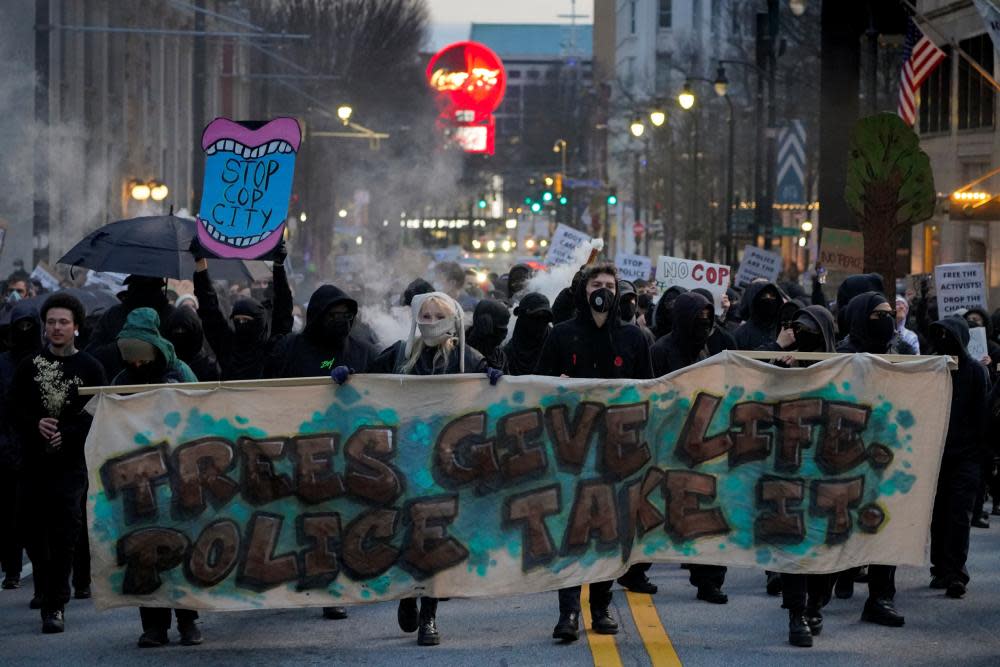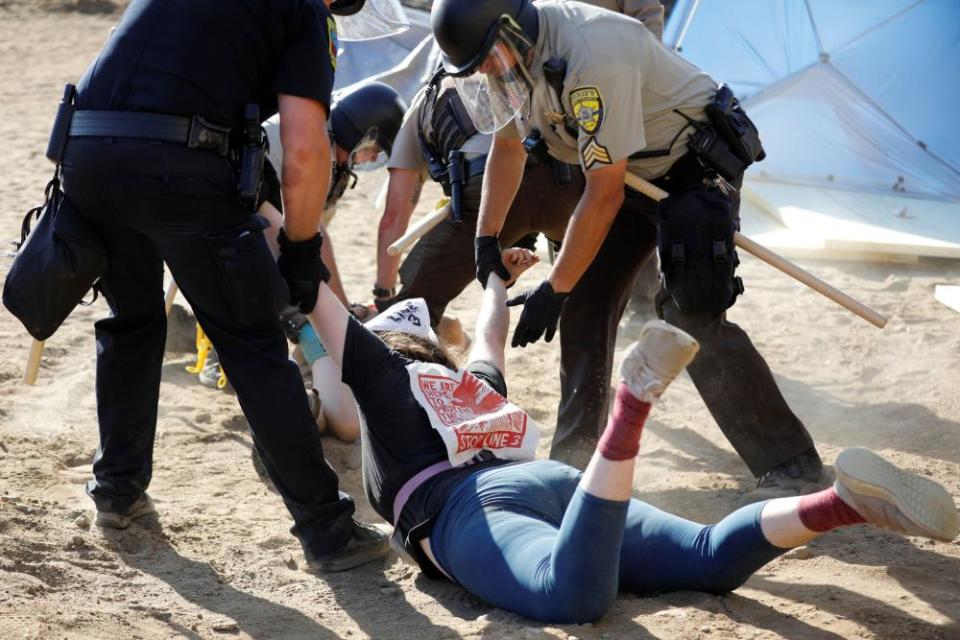Atlanta shooting part of alarming US crackdown on environmental defenders

The shooting of Manuel Esteban Paez Terán, believed to be the first environmental defender killed in the US, is the culmination of a dangerous escalation in the criminalization and repression of those who seek to protect natural resources in America, campaigners have warned.
The death of the 26-year-old, who was also known as “Tortuguita” or “Little Turtle,” in a forest on the fringes of Atlanta was the sort of deadly act “people who have been paying attention to this issue assumed would happen soon, with no sense of joy”, according to Marla Marcum, founder of the Climate Disobedience Center, which supports climate protesters.

“The police and the state have a callousness towards the lives of those on the frontline of environmental causes and I hope this is a wake-up call to those who didn’t know that,” she said. “I hope people take the time to notice what’s going on, because if this trajectory of criminalization continues, no one is going to be safe.”
Terán was shot and killed by police as officers from an assortment of forces swept through the small camp of a loose-knit activist group defending the urban forest on 18 January. Police say Terán shot and injured a Georgia state trooper with a handgun first, but the Georgia bureau of investigation has said the shooting was not recorded on body cameras, prompting calls for an independent investigation.
State and local authorities have reacted aggressively to protesters trying to stop 85 acres of the forest being torn down to build a sprawling, state-of-the-art, $90m police training complex – dubbed “Cop City” by opponents as it will feature a mock city for “tactical” exercises.
Nineteen forest defenders have been charged with felonies under Georgia’s domestic terrorism laws since December. Authorities have detailed the alleged acts of so-called terror by nine of those facing charges, which include trespassing, constructing a campsite and sitting in the trees of the woodland, a 300-acre wedge of land that once contained a prison farm but is now one of the largest urban forests in the US.
Brian Kemp, the Georgia governor who declared a state of emergency and mobilized 1,000 members of the national guard over the protests, has blamed “out-of-state rioters” and a “network of militant activists who have committed similar acts of domestic terrorism across the country” for the troubles.
Georgia’s response to the protests follows an alarming pattern of environmental and land rights defenders across the US being threatened, arrested and charged with increasingly drastic crimes, including terrorism, for opposing oil and gas pipelines or the destruction of forests or waterways, advocates claim.
Related: ‘Assassinated in cold blood’: activist killed protesting Georgia’s ‘Cop City’
“This was meant as a chilling deterrent, to show that the state can kill and jail environmental defenders with impunity. It reflects a trend towards escalation and violence to distract from the real issue of advancing corporate interests over lands,” said Nick Estes, author of Our History Is the Future: Standing Rock Versus the Dakota Access Pipeline, and the Long Tradition of Indigenous Resistance.
The current crackdown on environmental and land rights defenders can be traced back to the aftermath of 9/11 and the expansion of the definition of terrorism which sparked a wave of arrests known as the “green scare” targeting so-called eco- terrorists.
This then spurred the subsequent proliferation of state legislation criminalizing – or at least attempting to criminalize – all kinds of civil disobedience including Black Lives Matter protests and opposition to fossil fuel projects like gas pipelines, defined as critical infrastructure, essentially to protect business interests over environmental and Indigenous sovereignty concerns.
“The criminalization of land and water protectors and Indigenous nations using critical infrastructure security laws can be traced back to the Patriot Act. This has contributed to the current escalation as it allows the definition of terrorism to be more vague and expansive, which is intended to have a chilling effect on peaceful protesters,” said Kai Bosworth, author of Pipeline Populism and assistant professor of geography at Virginia Commonwealth University.
The 2016-17 uprising against the Dakota Access oil pipeline (DAPL), which cut through the Standing Rock reservation in North and South Dakota and threatened tribal lands, burial sites and water sources, sparked a brutal response by authorities that can be seen as a before and after in how environmental defenders are policed.
Law enforcement used automatic rifles, sound cannons, concussion grenades and police dogs against protesters, leading to hundreds of injuries as personnel and equipment poured in from over 75 agencies across the country. Indigenous leaders and journalists were among hundreds of arrests – including 142 on a single day in October 2016 – with scores facing felony charges and hefty fines.
Since then, a total of 20 states have enacted laws that impose harsh penalties for impeding “critical infrastructure”, such as making trespass a felony offense, or have brought in vaguely defined domestic terrorism laws that have been used to target environmentalists and Indigenous communities. Overall, 45 states have considered legislation restricting peaceful protests, and seven currently have laws pending.
These laws have “been successful in really tamping down dissent and sowing fear among people”, said Marcum. Much of this fear has been fueled by the labeling of protestors as “terrorists” by senior elected figures such as Kemp, according to Elly Page, senior legal advisor at the International Center for Not-for-Profit Law, which has tracked the anti-protest bills.
“We see autocrats around the world use rhetoric like that to clamp down on dissent,” Page said. “The widespread demonization of protestors we’ve seen from politicians who call them terrorists or a mob is incredibly harmful. I think that creates an environment where violence against protestors is not unlikely and that more of these tragedies will take place.”
Related: This lawyer should be world-famous for his battle with Chevron – but he’s in jail | Erin Brockovich
Many of the states’ legislation shares language drafted by the American Legislative Exchange Council (Alec), a rightwing group backed by fossil fuel companies.
In Florida, South Dakota and Oklahoma, for example, a “riot” is considered to be any unauthorized action by three or more people, while in Florida, Oklahoma and Iowa drivers who injure protestors blocking traffic, a common tactic used by environmental activists, are given legal immunity.
In Arkansas, an “act of terrorism” is considered to be anything that causes “substantial damage” to a public “monument”, which could include graffiti. Across 17 Republican-controlled states, protesters face up to 10 years in prison and million-dollar fines for offences.
The broad application of these laws, as well as accompanying legislation that criminalize people and organizations that support allegedly dangerous protestors, “chill activism and make it riskier for people to be involved in their right to protest”, said Page.

“Many of the laws have language so broad it makes constitutionally-protected speech illegal,” she said. “It gives authorities discretion to apply the law to an activity they don’t like … We know fossil fuel interests are promoting these sorts of laws.”
As the criminalization of peaceful protesters has spread, so has the rollout of new fossil fuel projects projects under both Democrat and Republican administrations – despite the escalation of costly and destructive extreme weather events caused by the climate breakdown.
“There have been no effective federal efforts to help protesters or defend against criminalization,” said Charmaine Chua, assistant professor of global studies at the University of California. “If you’ve been paying attention at the way cops indiscriminately kill people and the virulent antipathy towards protest movements trying to solve climate change, it’s hard to be surprised at Manuel’s death but still it does feel unprecedented.”
Related: Indigenous tribes tried to block a car battery mine. But the courts stood in the way
Sabine von Mering, one of around 900 protestors who were arrested for opposing the Line 3 pipeline that moves oil through Minnesota, said she was “deeply shocked” to hear of Terán’s killing but that she hoped it will galvanize more people to get involved in climate activism. “Any criminalization of protest is an attack on our democracy,” said von Mering, an academic at Brandeis University.
“At Line 3 there were several cases of police being extremely aggressive and violent, it was traumatizing to witness it and I’m an old white lady – I didn’t experience the worst of it. The charges were used to intimidate and quell protest.”
To critics of the fossil fuel industry, the Line 3 protests are a prime example of its ability to shape the law enforcement that is increasingly cracking down on its opponents. In 2021 it emerged that Enbridge, the Canadian company behind the pipeline, reimbursed US police $2.4m for arresting and surveilling hundreds of Line 3 demonstrators. The payments covered officer training, police surveillance, wages, overtime, meals, hotels and equipment.

Steven Donziger, an attorney who was embroiled in a long-running legal battle with Chevron on behalf of Indigenous people in Ecuador, said the payments are part of a “dangerous trend” of fossil fuel influence over the functions of government and the law.
“As we get closer to tipping point of no return on climate change, the effort to silence advocacy to have clean energy transition is intensifying,” Donziger said. “To attack young people who are trying to preserve a forest with a military-style assault is totally inappropriate but is unfortunately a sad reflection of where the country has gone.
“For weeks these people were called terrorists, which is a complete misuse of the word. The police have been conditioned to believe these people are terrorists and what do you do with terrorists? In the US you kill them. It becomes a self-fulfilling prophecy.”

 Yahoo News
Yahoo News 
